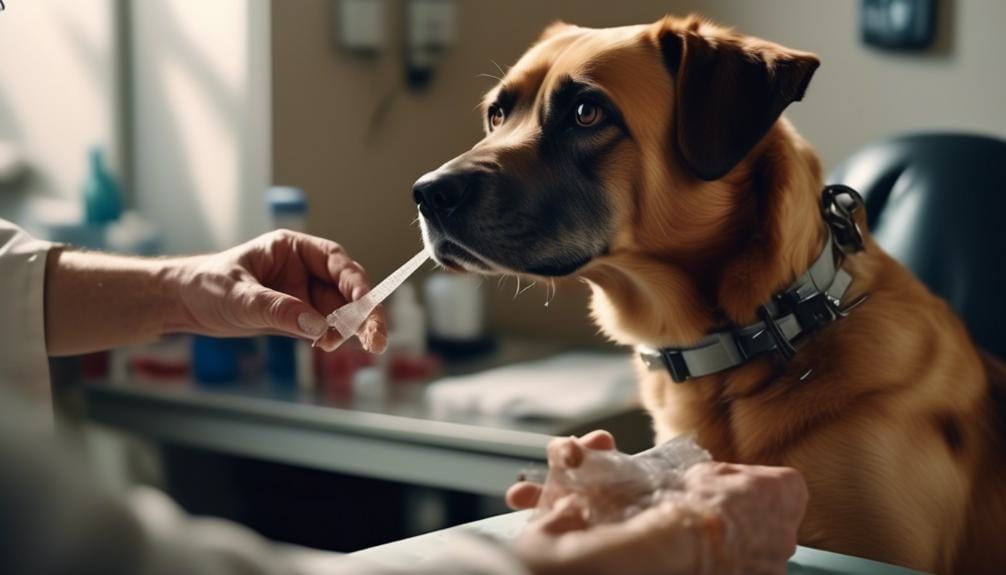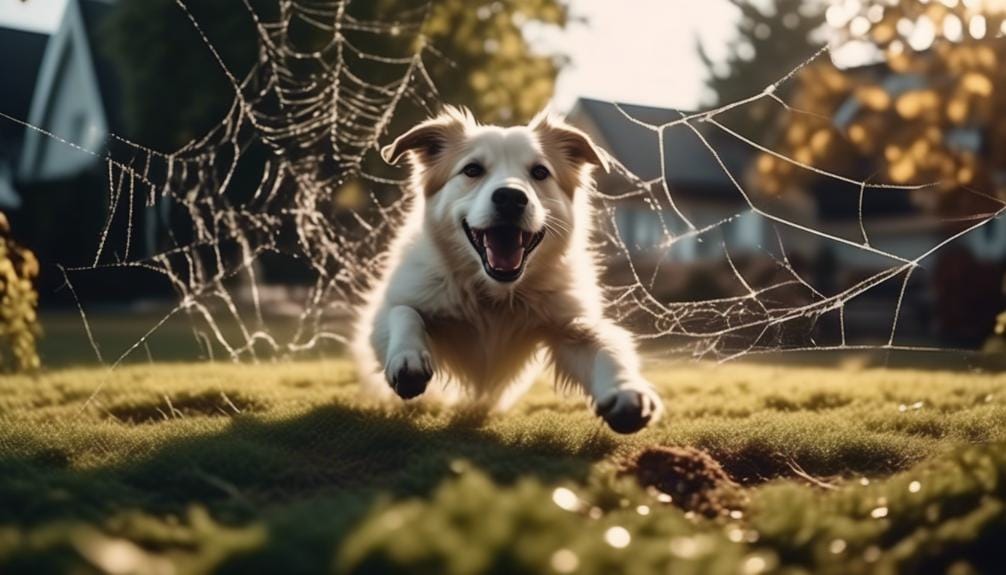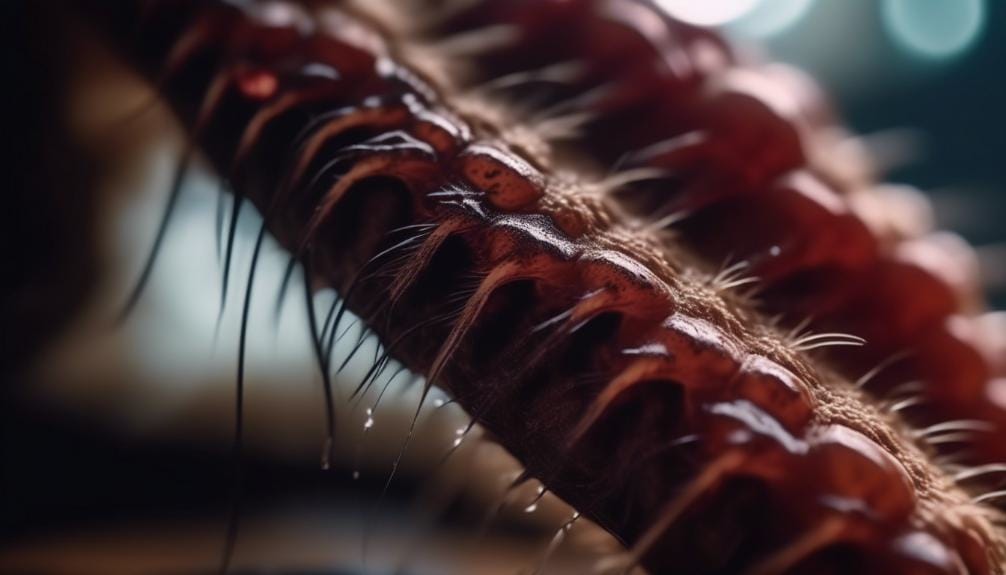Are Spiders Bad for Dogs? Understanding Potential Risks to Your Pet
As you watch your furry friend play in the yard, you can’t help but marvel at their curious nature. But have you ever considered the potential dangers lurking in the most unexpected places?
While spiders may seem harmless, did you know that certain species could pose a threat to your beloved pet? Understanding the risks associated with spider bites and learning how to safeguard your dog from potential harm is crucial.
So, what should you be aware of when it comes to spiders and your dog’s well-being?
Key Takeaways
- Black widows and brown recluse spiders are harmful to dogs and can be found in dark, secluded areas indoors and outdoors.
- Symptoms of spider bites in dogs include loss of appetite, vomiting or diarrhea, difficulty breathing, seizures or tremors, and necrotic skin lesions.
- Treatment for spider bites on dogs may include antibiotics, steroids, antihistamines, pain medication, and regular monitoring and follow-up visits with a veterinarian.
- To prevent spider bites in dogs, keep outdoor areas tidy, be mindful of spider habitats, educate yourself about venomous spiders in your region, regularly inspect your dog’s outdoor play areas, and seek veterinary care promptly if a spider bite is suspected.
Identifying Harmful Spider Species
To protect yourself and your pets from potential harm, it’s essential to be able to identify harmful spider species commonly found in your area. When it comes to spiders that pose a risk to your dog, two species are particularly concerning: the black widow and the brown recluse.
Black widows are shiny black with a red hourglass shape on their abdomen, while brown recluse spiders are light to dark brown with a darker violin-shaped marking on their back. These venomous spiders can be found in dark, secluded areas both indoors and outdoors, so it’s important to be cautious and aware of their presence.
If your dog is bitten by a venomous spider like the black widow or brown recluse, it’s crucial to seek veterinary care immediately. Symptoms of a black widow bite may include muscle pain, rigid abdomen, and difficulty breathing, while a brown recluse bite can cause a range of symptoms from mild irritation to severe ulceration at the bite site.
Being able to recognize these spiders and understanding the potential risks they pose to your dog can help you take proactive measures to ensure their safety.
Symptoms of Spider Bites in Dogs

If your dog has been bitten by a venomous spider like the black widow or brown recluse, it’s important to recognize the potential symptoms of spider bites in dogs to ensure prompt veterinary care. The following table outlines the symptoms of spider bites in dogs:
| Symptoms of Spider Bites in Dogs | Black Widow Bite | Brown Recluse Spider Bite |
|---|---|---|
| Loss of appetite | ✔ | ✔ |
| Vomiting or diarrhea | ✔ | ✔ |
| Difficulty breathing | ✔ | ✔ |
| Seizures or tremors | Rare | Rare |
| Necrotic skin lesions | ✘ | ✔ |
If you notice any of these signs in your dog, especially after being in an area known to harbor black widow and brown recluse spiders, seek immediate veterinary care. Loss of appetite, vomiting or diarrhea, difficulty breathing, seizures or tremors, and necrotic skin lesions can all be indicative of spider bites in dogs. Being aware of these symptoms can aid in timely intervention and the best possible outcome for your pet.
Treatment for Spider Bites on Dogs

When treating spider bites on dogs, it’s important to administer antibiotics, steroids, and supportive care as recommended by a veterinarian.
If you suspect a black widow bite or notice severe symptoms such as muscle pain, tremors, or difficulty breathing in your dog, seek immediate veterinary advice or head to an emergency vet. These venomous spider bites can be life-threatening to dogs and require prompt medical care.
Once under veterinary supervision, treatment may include antihistamines and pain medication to manage symptoms during recovery. Regular monitoring and follow-up visits with the veterinarian are crucial for proper healing and to prevent complications in dogs.
For non-venomous spider bites in dogs, monitoring and alleviation of discomfort with a cool compress and pet-friendly pain reliever cream may be sufficient. However, always consult with a veterinarian to ensure the best course of action for your dog’s specific situation.
It’s essential to prioritize your dog’s well-being and seek professional guidance in dealing with spider bites to ensure their prompt and effective treatment.
Preventing Spider Bites in Dogs

Regularly inspect your dog’s outdoor play areas to minimize the risk of spider encounters and help prevent spider bites. Here are some important steps to take to keep your dog safe from spider bites:
- Keep outdoor areas tidy: Store firewood and debris away from living spaces to reduce potential spider habitats near your dog’s environment.
- Be mindful of spider habitats: Spiders often favor dark corners and outdoor hiding spots. Be vigilant in these areas to prevent your dog from encountering them.
- Educate yourself about venomous spiders: Learn about the appearance and behavior of venomous spider species in your region. Black widow spiders and other venomous species are found in various parts of the United States. Early identification of these spiders can help in prevention for your dog.
In addition to these preventive measures, if you suspect your dog has been bitten by a spider, it’s crucial to seek veterinary care promptly. Knowing the clinical signs of spider bites in dogs and being proactive in preventing encounters with these arachnids will help keep your furry companion safe from potential harm.
What to Do if Your Dog Is Bitten by a Spider

Upon discovering a spider bite on your dog, it’s crucial to seek immediate veterinary care to ensure proper treatment and monitoring for their well-being. Spider bite symptoms may vary, ranging from mild irritation to severe reactions.
In regions like North America, two spiders of concern are black widows and recluse spiders. If you suspect your dog was bitten by a black widow or recluse spider, keep your dog calm and restrict their movement to prevent the venom from spreading. Apply a cold compress to reduce swelling at the bite site, but don’t attempt to treat the bite with home remedies or over-the-counter medications without veterinary guidance.
It’s essential to seek medical attention promptly. Contact your veterinarian to inform them of the situation and follow their instructions for further treatment and monitoring. Prompt veterinary care is crucial, as some spider bites can lead to serious complications, and early intervention can significantly improve your dog’s prognosis.
Frequently Asked Questions
Do Spiders Affect Dogs?
Yes, spiders can affect dogs. Bites from venomous spiders may cause pain, swelling, and tissue damage in dogs. If you suspect a spider bite, seek immediate veterinary care for your pet to ensure proper treatment.
Is It OK if a Dog Eats a Spider?
It’s generally okay if a dog eats a spider, as most spider species are not toxic to pets. Keep an eye on your dog for any signs of discomfort or unusual behavior. If you notice anything concerning, consult your veterinarian for guidance.
Can House Spiders Hurt Pets?
Yes, house spiders can potentially hurt pets. While most are harmless, venomous ones like black widows or brown recluses can cause severe symptoms. If you suspect a bite, seek immediate veterinary care for your pet.
How Do I Keep My Dog Safe From Spiders?
To keep your dog safe from spiders, regularly inspect their living environment, use pest control measures, and avoid spider-prone areas. Educate yourself about venomous spiders in your region and consider using insect repellents in high-risk areas.
Conclusion
In conclusion, it’s important to be aware of the potential risks spiders can pose to your dog. By identifying harmful spider species, recognizing symptoms of bites, and seeking immediate veterinary care, you can help protect your pet.
Taking preventative measures, such as keeping your living environment clean and insect-free, can also reduce the risk of spider bites. Remember to always prioritize your dog’s health and well-being.

